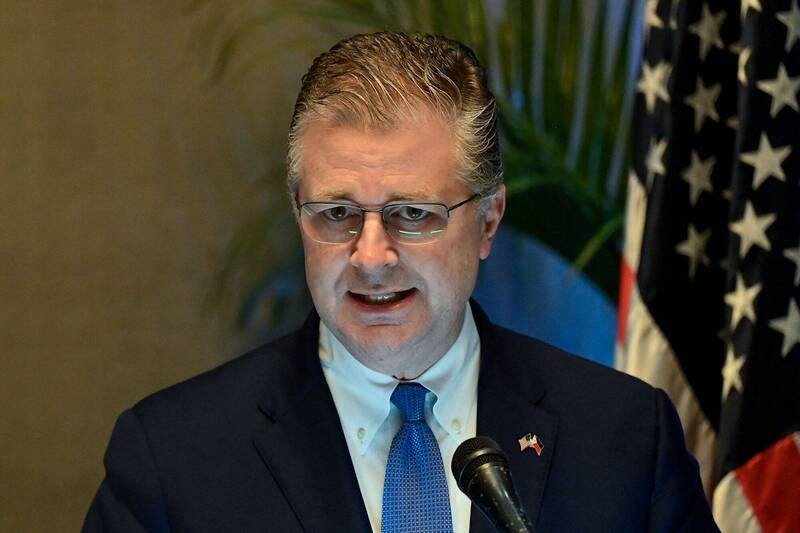Conda, Assistant Secretary for Asia and the Pacific, U.S. State Department.
(AFP)
[Central News Agency] Taiwan and the United States held a national security meeting at the Washington headquarters of the American Institute in Taiwan (AIT) on the 21st. Although the United States Assistant Secretary of State for Asia and the Pacific who attended the meeting today did not want to directly respond to questions related to the meeting, he pointed out that the United States regularly communicates with Taiwan. Will continue to do so.
Foreign Minister Wu Zhaoxie and National Security Council Secretary Gu Lixiong met with US Deputy Secretary of State Wendy Sherman and White House Indo-Pacific Affairs Coordinator at the AIT headquarters in Rosslyn, Virginia, near Washington on the 21st. Campbell (Kurt Campbell) and other US officials related to Taiwan held talks on national security issues, and the two sides talked for 7 hours.
Please read on...
Compared with the high level of secrecy in the past, the officials of this meeting did not shy away from media filming. The Financial Times even released the news beforehand. Although the US and Taiwan officials did not confirm or make relevant announcements, they did not deny it either.
On the second day of the meeting, Daniel Kritenbrink and Ely Ratner, Assistant Secretary of the US Department of Defense for Indo-Pacific Affairs, attended the online media briefing of the Foreign Press Club (FPC) in Washington to discuss US-China relations.
Faced with Taiwanese media's questioning about the Taiwan-U.S. security talks, Kangda continued to adopt the practice of neither confirming nor denying.
Kangda only said that the United States and Taiwan have a very important unofficial relationship. In order to maintain and strengthen the strong and beneficial relationship with Taiwan, the United States regularly communicates with Taiwan counterparts and will continue to do so in the future.
He also emphasized that the US "one-China policy" based on the Taiwan Relations Act, the three US-China communiqués and the six guarantees has not changed.
Talking about the continuous warming of relations between Taiwan and Eastern European countries, Kang Tat said that Taiwan is a very capable democracy, and developing pragmatic and functional relations with Taiwan is of great benefit to global partners; in addition, allowing Taiwan to participate in all countries that do not require sovereignty Organizations that require sovereign qualifications and interact in a meaningful way within organizations that require sovereign national qualifications are also beneficial to the international community.
Kangda reiterated that maintaining peace and stability in the Taiwan Strait and ensuring the peaceful resolution of cross-strait differences is in the fundamental interests of the United States. This is the focus of future U.S. policy, and the U.S. will continue to fulfill its obligations to Taiwan under the Taiwan Relations Act.
Retner echoed that the United States will continue to fulfill its commitments to Taiwan, including providing Taiwan with the weapons it needs for self-defense, and will also maintain its ability to resist any acts of force that endanger the security of the people of Taiwan.
As for how to avoid misjudgment in the Taiwan Strait, Retner pointed out that the U.S. side is disappointed by the CCP’s reluctance to talk to U.S. Secretary of Defense Lloyd Austin in the near future, but it will continue to extend its hands in the future and invite China to maintain a smooth communication channel.
Ritner was referring to the day the U.S. military shot down a Chinese surveillance balloon that invaded U.S. airspace on Feb. 4. Washington asked Austin to speak with Chinese Defense Minister Wei Fenghe on security issues, but Beijing refused.
